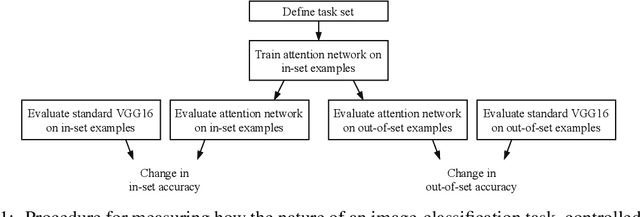The perceptual boost of visual attention is task-dependent in naturalistic settings
Paper and Code
Feb 22, 2020


Attentional modulation of neural representations is known to enhance processing of task-relevant visual information. Is the resulting perceptual boost task-dependent in naturalistic settings? We aim to answer this with a large-scale computational experiment. First we design a series of visual tasks, each consisting of classifying images from a particular task set (group of image categories). The nature of a given task is determined by which categories are included in the task set. Then on each task we compare the accuracy of an attention-augmented neural network to that of an attention-free counterpart. We show that, all else being equal, the performance impact of attention is stronger with increasing task-set difficulty, weaker with increasing task-set size, and weaker with increasing perceptual similarity within a task set.
 Add to Chrome
Add to Chrome Add to Firefox
Add to Firefox Add to Edge
Add to Edge